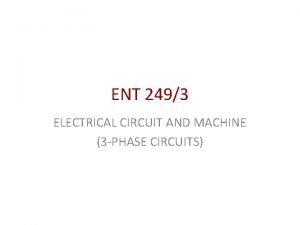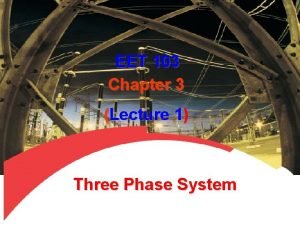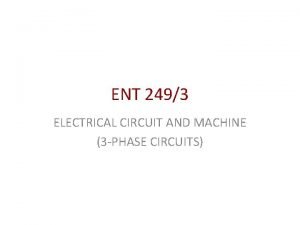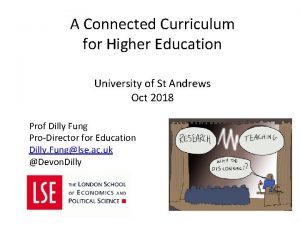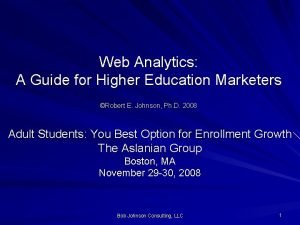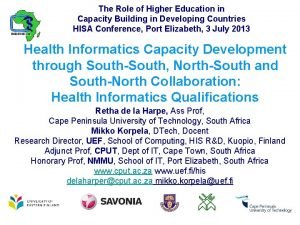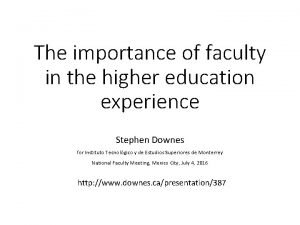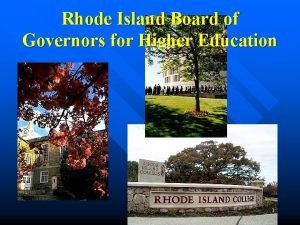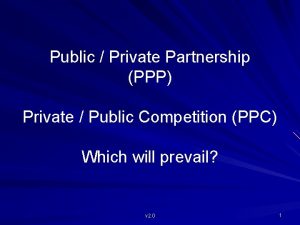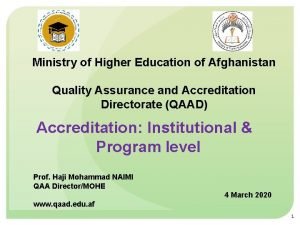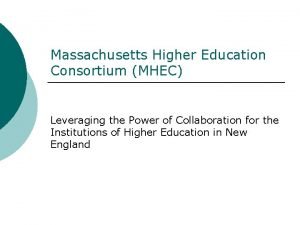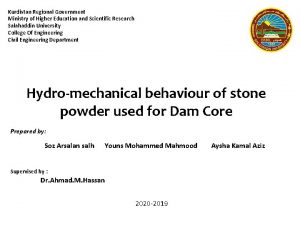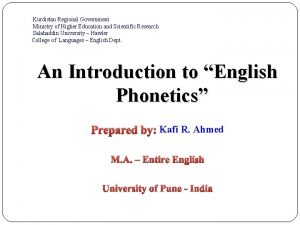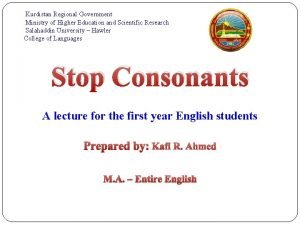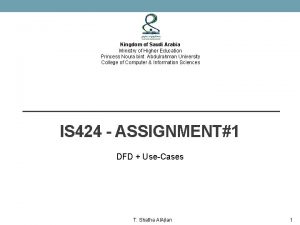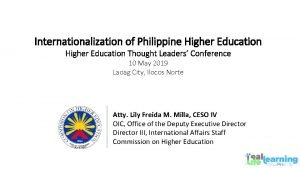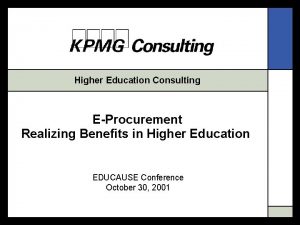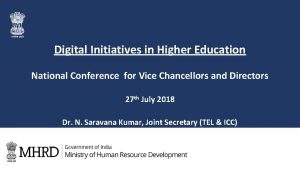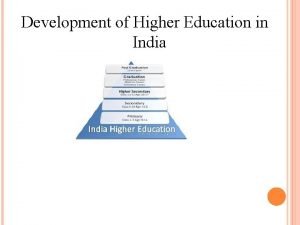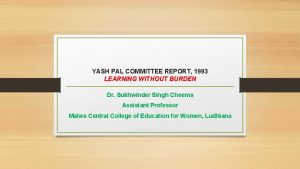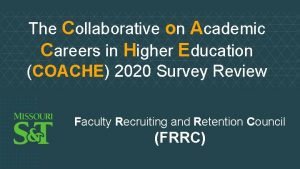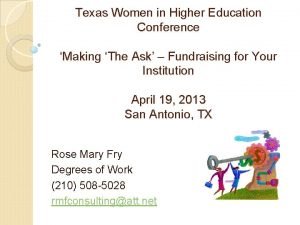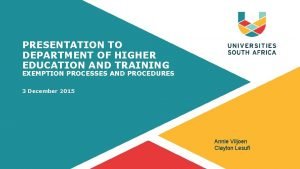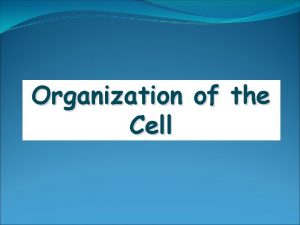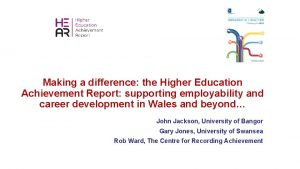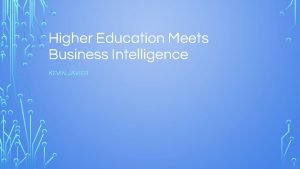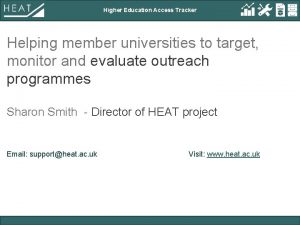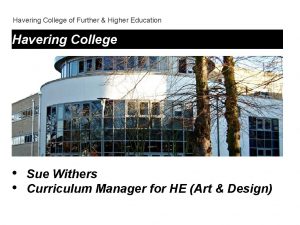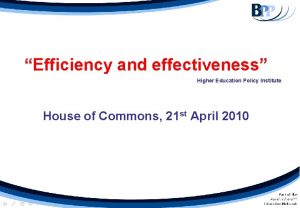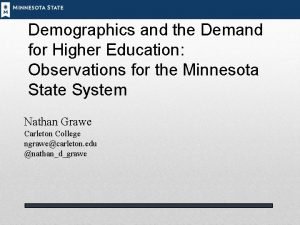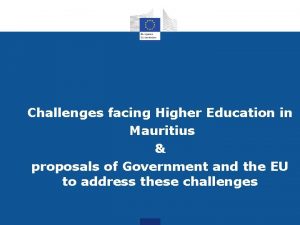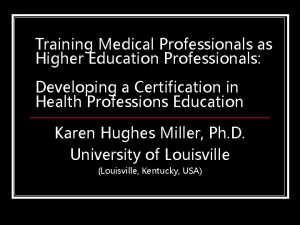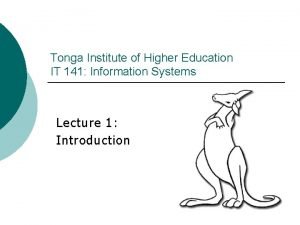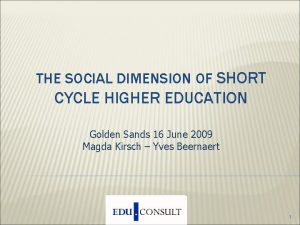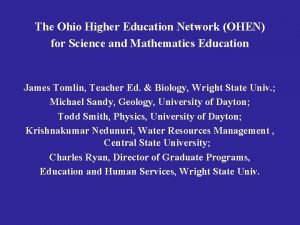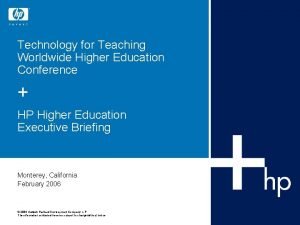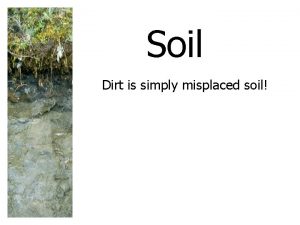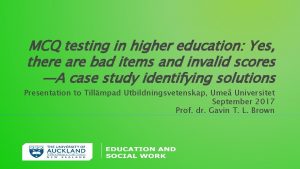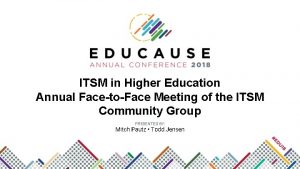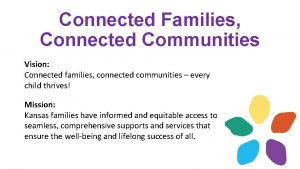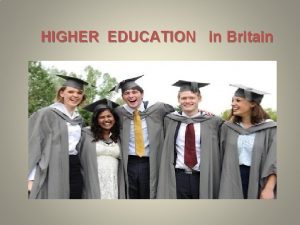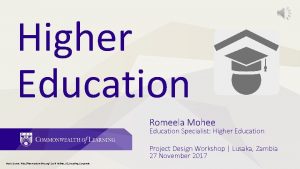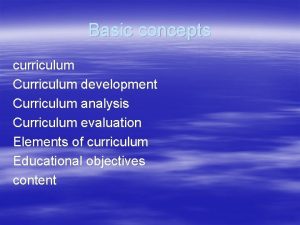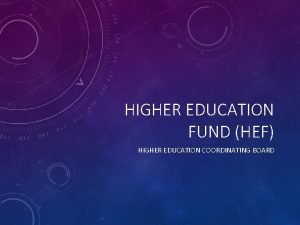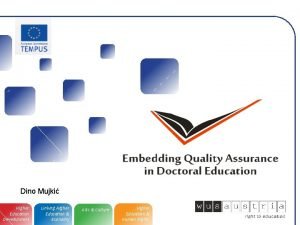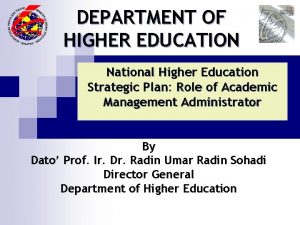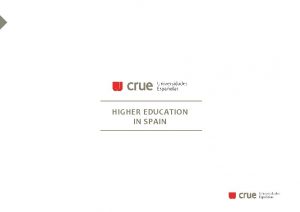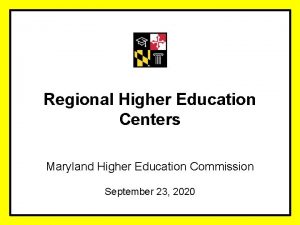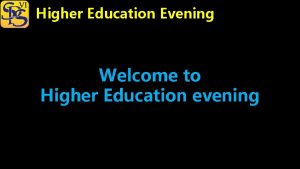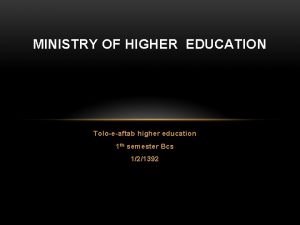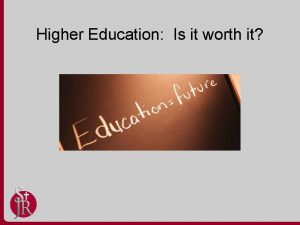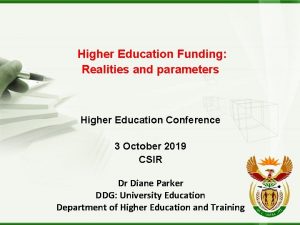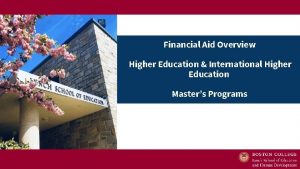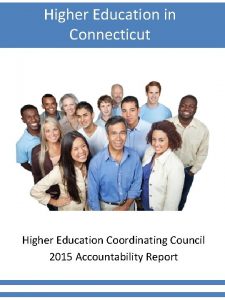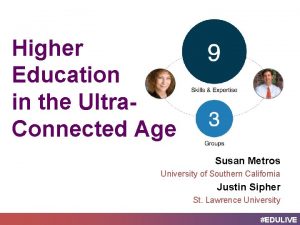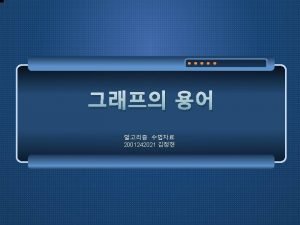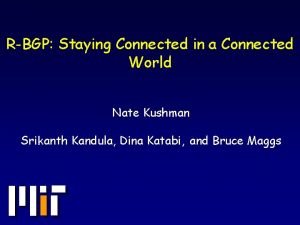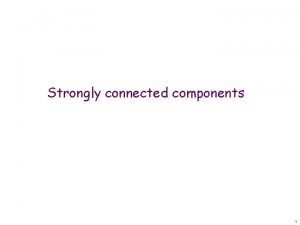A Connected Curriculum for Higher Education University of







































- Slides: 39

A Connected Curriculum for Higher Education University of St Andrews Oct 2018 Prof Dilly Fung Pro-Director for Education Dilly. Fung@lse. ac. uk @Devon. Dilly

Overview 1. Revisiting scholarship and scholarly values 2. Evidence for research-based education 3. The Connected Curriculum framework 4. Enablers of change 5. Conclusions and discussion

Overview 1. Revisiting scholarship and scholarly values

Research equals education There is no contradiction between the imperative of good teaching and the imperative of research which critiques, refines, discards and advances human knowledge and understanding. (Mc. Aleese 2013, 13)

Related scholarships of discovery, integration, application and teaching ‘We believe that the time has come to move beyond the tired old 'teaching versus research' debate and give the familiar and honorable term 'scholarship' a broader, more capacious meaning, one that brings legitimacy to the full scope of academic work’ (Boyer 1990, p 16).

‘Good’ education: a philosophical framing Drawing on philosophical hermeneutics, education may be defined as: • ‘self-formation’ and collective advancement through critical dialogue • the widening of horizons (Gadamer, 2004) Education is underpinned by the need for the human mind to remain ‘unsatisfied with what it imagines it knows’ (Fairfield 2010, 3).

What is education for? Education is ‘for the global common good’, embodying a ‘shared responsibility for a sustainable future’ (UNESCO 2015, 9)

LSE Education for Global Impact

Overview 2. Evidence for research-based education

Benefits to students of a distinctive, research-rich education Benefits for students … arise from the intellectual depth associated with engaging in any cutting edge investigations, and from the range of skills associated with independent and collaborative enquiry. ’ (Fung, Besters-Dilger and van der Vaart, 2017)

Good education: an evidence base Increasing evidence through empirical studies that students learn more effectively through active, enquiry-based learning as long as it is structured with peer collaboration and dialogic feedback. See, for example, Blessinger and Carfora eds. 2014; Wood 2010; Spronken-Smith and Walker 2010; Levy and Petrulis 2012.

Comparing traditional teaching with inquiry-based learning Comparative experiment: students who had to engage in interactive, research-based methods and received feedback from fellow students and their instructor were later tested in a quiz designed to ‘probe the mastery of the learning objectives’ (Wieman and Gilbert 2015, 155). Students engaging in active inquiry outperformed the other, traditionally taught student cohort significantly, across the entire distribution.

Evidence of the value of inquiry-based learning (IBL) in arts, humanities and social science subjects From Levy and Petrulis (2012, 97) See also Blessinger and Carfora eds. 2014; Wood 2010; Spronken-Smith and Walker 2010.

Examples of changing practice in Europe Université Pierre et Marie Curie (UPMC): Compulsory first year workshops focus on “peer project” methods. Students work in small groups to master a scientific topic and work through researchthinking processes to produce results. University of Edinburgh: “Our changing world” is an interdisciplinary first-year course about global challenges, aiming at raising awareness how research and scholarship meet these challenges. Students are expected to address key global issues across disciplines. KU Leuven: Service-learning opportunities are created for students, who serve a ‘real world’ community, mobilising their academic knowledge, skills and (Fung et al. 2017) attitudes.

Overview 3. The Connected Curriculum framework

The Connected Curriculum Fung, D. (2017) A Connected Curriculum for Higher Education UCL Press: London Free download http: //discovery. ucl. ac. uk/15587 76/1/A-Connected-Curriculumfor-Higher-Education. pdf

The core principle: learning through research and enquiry • What is research in our subject(s)? What principles, practices and values underpin our research? • In what ways, and when, are our students already engaging in forms of enquiry and/or their own investigative research? • Do our approaches to student assessment promote authentic enquiry?

1. Connecting with research and researchers • Are students introduced to and inspired by the latest research in the field, including that undertaken by the department? • Do their courses and the wider activities and events in their department enable them to meet, learn from and even challenge researchers and scholars?

Practical examples: Connecting with Researchers During induction week 145 first-year UG students in Brain Sciences view a selection of videos with academics discussing their research, identify someone to interview, & present findings in seminar group. Meet Your Researcher template available at https: //www. ucl. ac. uk/teachinglearning/connectedcurriculum/Meet_your_researcher

2. A ‘throughline’ as part of programme design • Is there a connective storyline of enquiry, e. g. in the pattern of learning/research activities and assessments, which helps students to build their own coherent learning narrative? • Is there a clearly constructed sequence of enquiry-based activities across the years of study that enables students to go beyond accumulating knowledge and develop themselves reflectively as critical, creative people?

Programme-wide Showcase Portfolios (Fung 2017) Towards the end of their degree, students: 1. Select, curate and gather their best work, in line with programme-level intended learning outcomes, so that it is accessible to an external audience 2. Produce an analytical yet personal narrative that introduces the selected works to an external audience. This may be in any form that engages the target audience and that can be accessed online, e. g. academic blog, multi-media presentation, podcast or video documentary

3. Outward looking, interdisciplinary connections • Can students connect outwards from their immediate subject(s) of study and learn to tackle multilayered challenges using different ‘knowledge lenses’? • In doing this, can they build understandings of and links with appropriate external communities and organisations? • Are they encouraged to analyse their ethical bearings through developing research integrity, social responsibility and global citizenship?

Interdisciplinarity ‘How to change the world’ (Engineering at UCL): Students work in multidisciplinary teams of five to six developing practical solutions to societal and environmental challenges set by external organisations, for example energy generation in rural African locations, or reducing urban congestion. Assessed through group presentations.

4. Workplace connections • Are students developing a range of professional attributes, such as leadership, project management, creativity, communication and problem-solving skills? • Can students make and articulate conceptual and practical connections between their academic learning and the lifelong learning needed for employment and for their future lives?

‘Engaging with Europe’: Compulsory course for all taught masters students at the European Institute, LSE. Guest speakers, often alumni, introduce a professional skill (e. g. blog writing, speech writing, legislative drafting), contextualising it within a relevant European institutional setting, from which students produce relevant outputs.

5. Students as producers: outward-facing assessments • Are some assessments of student learning outward facing, directed at an identified audience, giving students a voice beyond the class? • Can students demonstrate an ability to use a range of digital media effectively, as well as different modes of writing, visual and oral communication, as they express their insights and arguments to others, both within and beyond the institution?

Students on a ‘Sustainability in Business’ module at the University of Liverpool Management School undertake a relevant area of research and enquiry and submit various outputs, including an edited wiki and reports which inform sustainability activities at the university.

6. Interpersonal connections • Are students explicitly invited into an inclusive research and learning community? • Are there opportunities for them to meet, mentor and work collaboratively with their fellow students across year groups? • Are alumni actively engaged in the community, e. g. by enriching the curriculum with their expertise, contributing to mentoring schemes or working with departments to enhance their educational provision?

Personal and cross-phase connections Second year Physics students at UCL make short videos explaining concepts they personally found challenging to first years, as part of a ‘communicating science’ module. Other examples include peer mentoring, peer study groups, alumni mentoring, and undergraduate research seminars/conferences

The Connected Curriculum Fung, D. (2017) A Connected Curriculum for Higher Education UCL Press: London Free download http: //discovery. ucl. ac. uk/15587 76/1/A-Connected-Curriculumfor-Higher-Education. pdf

Overview 4. Enablers of change

Areas for review to enable change may include: • New ways of engaging students as partners: see UCL Change. Makers • Processes for designing and approving new programmes and modules • Technological infrastructure and digital spaces • Assessment rules and regulations • Learning spaces, both digital and physical, and timetabling • Revisiting academic development, job families, reward and promotion policies, and types of working collaborations between those in different roles

Rewarding educators and education leaders If we break down some of the structural and conceptual divides between research, practice and education, we can § develop distinctive new forms of research-based education § and move towards achieving ‘parity of esteem’ for educators, practitioners and researchers. (Fung and Gordon 2016)

Overview 5. Conclusions and discussion

Concluding hopes for the future ‘Breaking down longstanding divisions between research and education can … build stronger bridges between research, education, professional practice and society. As these boundaries are crossed, so older hierarchical distinctions become less powerful, and new kinds of conversations and collaborations become possible’ (Fung 2017, 156).

A Connected Curriculum for Higher Education Discussion Prof Dilly Fung Pro-Director for Education Dilly. Fung@lse. ac. uk @Devon. Dilly

Supporting references Blessinger, Patrick and Carfora, John M. Eds. (2014) Inquiry-Based Learning for the Arts, Humanities and Social Sciences: A Conceptual and Practical Resource for Educators: 2. Innovations in Higher Education Teaching and Learning. Bingley, UK: Emerald. Carnell, Brent and Fung, Dilly (eds. ) (2017) Developing the Higher Education Curriculum: Research-based Education in Practice. London: UCL Press http: //discovery. ucl. ac. uk/10032889/1/Developing-the-Higher-Education. Curriculum. pdf Fairfield, Paul ed. (2011) Education, Dialogue and Hermeneutics. London: Continuum. Fung, Dilly (2017) A Connected Curriculum for Higher Education London: UCL Press http: //discovery. ucl. ac. uk/1558776/1/A-Connected-Curriculum-for-Higher. Education. pdf Fung, Dilly, Besters-Dilger, Juliane and Van der Vaart, Rob (2017) Excellent education in research-rich universities. League of European Research Universities (LERU) Position Paper. http: //www. leru. org/files/publications/LERU_Position_Paper_Excellent_Education. pdf Fung, Dilly and Gordon, Claire (2016) Rewarding educators and education leaders in research-intensive universities https: //www. heacademy. ac. uk/sites/default/files/rewarding_educators_and_education _leaders. pdf

Gadamer, Hans-Georg (2004) Truth and Method (Second, Revised ed. ). (J. W. Marshall, Trans. ) London and New York: Continuum. Harland, Tony and Wald, Navé (2017) Curriculum, teaching and powerful knowledge. Higher Education. https: //doi. org/10. 1007/s 10734 -017 -0228 -8 Levy, Philippa and Robert Petrulis (2012) ‘How do first year university students experience inquiry and research, and what are the implications for the practice of inquiry-based learning? ’ Studies in Higher Education 37 1: 85 -101. http: //dx. doi. org/10. 1080/03075079. 2010. 499166 Mc. Aleese, Mary. 2013. Report to the European Commission: Improving the quality of teaching and learning in Europe’s higher education institutions. http: //ec. europa. eu/education/higher-education/doc/modernisation_en. pdf. Pinar, William F. 2012. What is Curriculum Theory? 2 nd edition. New York: Routledge. https: //www. sheffield. ac. uk/polopoly_fs/1. 122794!/file/IBL_in_Arts-FINAL. pdf Spronken-Smith, Rachel and Walker, Rebecca (2010) ‘Can inquiry-based learning strengthen the links between teaching and disciplinary research? ’ Studies in Higher Education 35: 723 -740. doi: 10. 1080/03075070903315502. Tong, Vincent C H, Standen, Alex and Sotiriou, Mina (eds. ) (2018) Shaping Higher Education with Students: Ways to Connect Research and Teaching. London: UCL Press http: //discovery. ucl. ac. uk/10044671/1/Shaping-Higher-Education-with-Students. pdf

UNESCO (2015). ‘Rethinking Education: Towards a Global Common Good? ’ Paris: United Nations Educational, Scientific and Cultural Organization Wieman, Carl and Gilbert, Sarah (2015) Taking a Scientific Approach to Science Education, Part I–Research and Part II—Changing Teaching. Microbe, Vol. 10(4), pp. 152 -156 (2015) & Vol. 10(5), pp. 203 -207 (2015) Wood, Jamie (2010) ‘Inquiry-based Learning in the Arts: A meta-analytical study. ’ CILASS (Centre for Inquiry-based Learning in the Arts and Social Sciences), University of Sheffield.
 In a triangle connected source feeding a y connected load
In a triangle connected source feeding a y connected load In a triangle connected source feeding
In a triangle connected source feeding Phase to phase voltage
Phase to phase voltage Connected curriculum
Connected curriculum Higher education web analytics
Higher education web analytics Capacity building in the field of higher education
Capacity building in the field of higher education Importance of faculty in higher education
Importance of faculty in higher education Ri board of governors
Ri board of governors Ppc for higher education
Ppc for higher education Ministry of higher education (afghanistan)
Ministry of higher education (afghanistan) Massachusetts higher education consortium
Massachusetts higher education consortium Ministry of higher education kurdistan
Ministry of higher education kurdistan Krg ministry of higher education
Krg ministry of higher education Krg ministry of higher education
Krg ministry of higher education Ministry of higher education saudi arabia
Ministry of higher education saudi arabia Internationalization of higher education in the philippines
Internationalization of higher education in the philippines Higher education eprocurement
Higher education eprocurement Digital initiatives in higher education
Digital initiatives in higher education Gartner digital transformation in higher education
Gartner digital transformation in higher education Development of higher education in india
Development of higher education in india Name of yashpal committee report 1993
Name of yashpal committee report 1993 Collaborative on academic careers in higher education
Collaborative on academic careers in higher education Texas women in higher education conference
Texas women in higher education conference Department of higher education and training
Department of higher education and training 2007 thomson higher education
2007 thomson higher education Higher education achievement report
Higher education achievement report Business intelligence in higher education
Business intelligence in higher education Higher education access tracker
Higher education access tracker Havering college of further and higher education
Havering college of further and higher education Efficiency and effectiveness in higher education
Efficiency and effectiveness in higher education Demographics and the demand for higher education
Demographics and the demand for higher education Higher education mauritius
Higher education mauritius Training for higher education professionals
Training for higher education professionals Tonga institute of higher education
Tonga institute of higher education Short cycle higher education
Short cycle higher education Fen ohen
Fen ohen Hp higher education
Hp higher education Thomson higher education 2007
Thomson higher education 2007 Mcq on higher education
Mcq on higher education Higher ed itsm
Higher ed itsm
